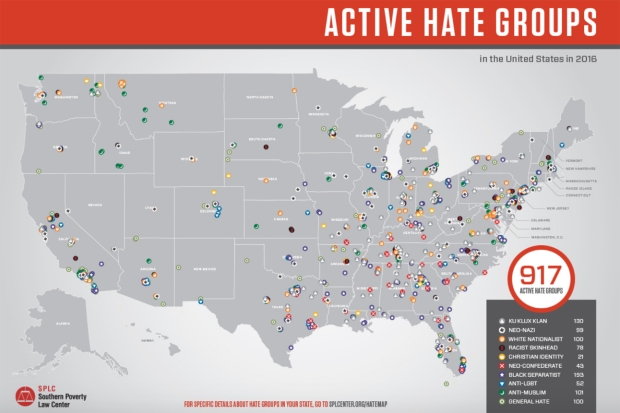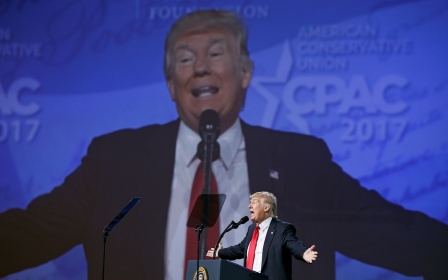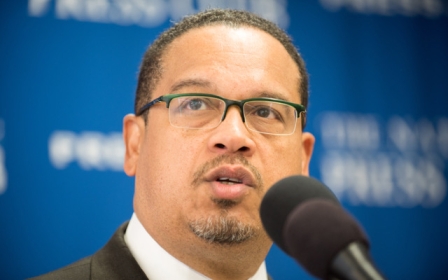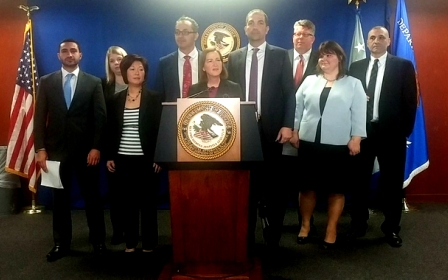Mistaken as Middle Eastern, Indian slain in Kansas as hate crimes surge
A 51-year-old man has been charged with killing an engineer from India and wounding two other men when he opened fire in a Kansas bar in what federal authorities were investigating on Friday as a possible bias-motivated crime that shocked the victim's home country.
The shooting on Wednesday night led news bulletins in India and triggered outrage on social media, where people voiced concern that US President Donald Trump's "America First" position on immigration and jobs has fueled a climate of hatred and intolerance.
White House spokesman Sean Spicer said on Friday that any loss of life was tragic but it would be absurd to link the killing to Trump's rhetoric.
Pratik Mathur, a spokesman for the Indian embassy in Washington, said India had expressed "our deep concern over the incident" to the US government and requested a "thorough and speedy investigation".
Navy veteran Adam Purinton, who is white, was charged on Thursday in Johnson County, Kansas, with one count of premeditated first-degree murder and two counts of attempted premeditated first-degree murder, District Attorney Stephen Howe told reporters.
'Trump's run for office electrified the radical right, which saw in him a champion of the idea that America is fundamentally a white man's country' - Southern Poverty Law Center
He declined to elaborate on details of the incident or the gunman's motive.
The FBI was looking at whether it was a hate crime, the official term for crimes motivated by bias or prejudice. An FBI spokeswoman said agents and police canvassed the area on Thursday and the investigation continued on Friday.
Hate crime charges would need to be brought in federal court because Kansas does not have a hate crime statute, the district attorney said in a post on Twitter. If convicted as charged, Howe said Purinton faces "Hard 50," which means a life sentence without eligibility for parole for 50 years.
Purinton is accused of killing Srinivas Kuchibhotla, 32, and wounding Alok Madasani, also 32, in Austins Bar and Grill in Olathe, Kansas, on Wednesday evening, police said. At least one bystander told the Kansas City Star the gunman shouted "Get out of my country" before shooting the Indian victims.
The suspect fled on foot and was arrested five hours after the shooting at an Applebee's restaurant in Clinton, Missouri. He reportedly told an employee there he needed a place to hide because he had killed two Middle Eastern men.
Purinton is suffering from post traumatic stress disorder and a "serious illness," his neighbour told local media. He is also accused of wounding Ian Grillot, 24, who was shot as he tried to intervene.
"People call me a hero," Grillot said in a video released by the hospital where he was undergoing treatment for gunshot wounds to the hand and chest. "I was just doing what anyone should have done for any other human being."
Kuchibhotla was married but had no children. His wife, identified by media as Sunayana Dumala, told reporters on Friday that the gunman "has taken a life, a very lovable soul, from everyone".
The shooting comes as some members of US minority groups have expressed unease with the political and social climate in the US. The Southern Poverty Law Center said in a report this month that hate groups proliferated in 2016 as Trump's bid for the presidency energized the far right.
"Trump's run for office electrified the radical right, which saw in him a champion of the idea that America is fundamentally a white man's country," the Southern Poverty Law Center said.
The nonprofit civil rights organisation said in its annual census of hate groups that anti-Muslim groups nearly tripled to 101 in 2016 from 34 in 2015. It said hate groups in the US numbered 917 last year, compared with 892 in 2015.
Researchers for the Alabama-based organization said the number of crimes against Muslims had risen with the number of hate groups. They cited the burning of a Texas mosque after the Trump administration issued an executive order suspending travel to the US from seven Muslim-majority countries.
"2016 was an unprecedented year for hate," said Mark Potok, senior fellow and editor of the Intelligence Report.
"The country saw a resurgence of white nationalism that imperils the racial progress we've made, along with the rise of a president whose policies reflect the values of white nationalists," Potok said.
The report said the number of groups likely understated the level of organised hatred in the US because "a growing number of extremists operate mainly online and are not formally affiliated with hate groups".
"The radical right in the United States has more of a chance, an opportunity, to directly affect real life national policy at this moment than at any time in at least half a century," Potok told a teleconference after the report was released.
New MEE newsletter: Jerusalem Dispatch
Sign up to get the latest insights and analysis on Israel-Palestine, alongside Turkey Unpacked and other MEE newsletters
Middle East Eye delivers independent and unrivalled coverage and analysis of the Middle East, North Africa and beyond. To learn more about republishing this content and the associated fees, please fill out this form. More about MEE can be found here.





